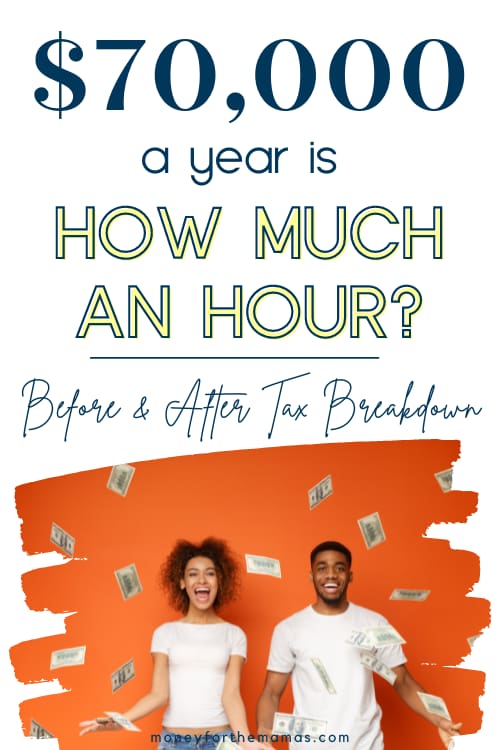$70k a Year is How Much an Hour? (Before & After Tax Breakdown)
Looking at a new job that’s offering a $70k a year salary – we’re breaking down all the details, including sample monthly budgets.

Author: Kari Lorz – Certified Financial Education Instructor
$70,000 a year is the sweet spot for many American workers. It’s enough to cover your monthly budget expenses, and still have some extra cash left over for long-term savings (and fun)!
Sure, $70k sounds good, but $70,000 a year is how much an hour? How much of that goes to taxes, and most importantly, how much of that $70k do I actually bring home?
Don’t worry; we’ll be covering all of this (and some monthly budget examples), so you’ll know exactly what that $70k a year salary gets you!

This post may contain affiliate links. If you make a purchase, I may make a commission at no cost to you. Please read my full disclosure for more info
- Looking at a new job that's offering a $70k a year salary – we're breaking down all the details, including sample monthly budgets.
- If you make a $70k salary, how much is that after federal and state taxes?
- What do retirement contributions do to my take-home pay?
- How much does insurance take from my $70,000 annual salary?
- How to live on $70k a year
- Is $70,000 an income considered middle class?
- How should I budget a 70k salary?
- Can you live off of $70k a year?
- Jobs that make $70,000 a year
- What skills do I need to make $70k a year?
- What is a salaried job?
- $75,000 a year is how much an hour?
- $75,000 Is the perfect salary for true happiness
- At the end of the day
$70,000 a year is how much an hour (short answer).
- Let’s say you work the traditional 40 hr workweek:
- $70,000 / 52 weeks a year = $1,346 a week / 40 hours = $33.65 an hour
- If you work 50 hrs a week (which would be more typical for a salaried worker).
- $70,000 / 52 weeks a year = $1,346 a week / 50 hrs = $26.92 an hour.
How much is $70k a year in monthly pay?
- $70,000 / 12 months = $5,833 gross pay
How much is 70,000 dollars a year in bi-weekly pay?
- $70,000 / 26 pay periods = $2,692 gross pay
$70k is how much a week?
- $70,000 / 52 weeks = $1,346 gross pay
$70,000 is how much a day?
If you work 40 hours a week, 8 hours a day = $271 a day when working.
$70k a year is how much an hour?
Remember you are salaried! That means you get paid that same even when you work overtime. So at five days a week…
- 8-hour workday: $33.65 hourly pay
- 10-hour workday: $26.92 hourly pay
Sorry to say you don’t just take home $70,000 if that’s your pay. You still have to pay taxes. Let’s look at how your take-home (after-tax) income is affected.
If you make a $70k salary, how much is that after federal and state taxes?
Calculating your tax burden is critical to understanding your salary. If you do the math and base your bills on pre-tax income, you’ll be in for a nasty surprise! As a result, always look at how much you’ll pay in taxes.
For example, let’s assume you’re a single filer:
- If you live in California, which has a very high state income tax rate…
- You’ll pay $16,796 annually in FICA, federal tax, and state tax (roughly)
- You’ll take home $53,204 (before insurance and misc deductions)

You can go here to give you a rough idea of how much you’ll pay. Remember, this is just a reasonable rough estimate, not a guarantee!
You lost almost 24% of your pay to state & federal taxes.
The current tax rate for $70k a year
If you make $70k a year and are single with no children, your current tax rate is 22% for federal taxes…
- $40,526 to $86,375 income = 22% tax bracket rate
What do retirement contributions do to my take-home pay?
Yes! I’m excited that you brought it up! One of the most important long-term financial planning decisions is to contribute to your employer’s retirement plan. So, yes, you absolutely want to do it!
Companies usually match a specific amount (as a percentage) of the pay that you put in. So if you put in 5% of your gross income into a traditional 401k, they will also match that 5%. Usually, companies have a max amount that they will contribute; 5% is a good general figure.
So, if you make $70,000 a year and contribute 5%, that means $3,500 annually in workplace retirement plan contributions by you and another $3,500 with your employer match!
You now have a taxable income of $66,500. Using the same calculator shown above, you’ll take home $50,799 (before insurance deductions).
- $53,204 take home with no retirement contributions
- $50,799 with a 5% contribution
- = a difference of $2,405 in take-home pay (before medical and other misc deductions).
The graph below shows what a 5% retirement contribution looks like plus a 5% company match over the span of 30 years. Don’t forget that you’ll probably get raises along the way too, which will bump up your future total balance.
At the end of 30 years, at a 7% return, you’ll have…
- Contributed $210,100 (total principal)
- Earned $529,748 in interest
- Total of $739,848
If you’re changing jobs, then you need to make sure that you take all your money with you! According to Capitalize, “As of May 2021, we estimate that there are 24.3 million forgotten 401(k)s holding approximately $1.35 trillion in assets, with another 2.8 million left behind.
That’s a lot of money for employees to just “forget about.” Don’t be a worker who left money on the table when they switched jobs! Beagle can help you find your old 401k accounts and help you roll them over into an account that you can easily manage.
While the full process takes a few days (they need 2-3 days to research everything), the initial sign-up process takes less than 15 minutes. You tell them your info, give them an idea of what companies you worked for, and they go find your old accounts.
We went through the process, and it was super easy; you can read our full review on Beagle retirement savings finder here! Or you can check out Beagle by clicking the green button below.
How much does insurance take from my $70,000 annual salary?
Sorry to say that we’re not done with your paycheck deductions. According to the U.S. Bureau of Labor, “Health care is typically one of the most expensive benefits for employers to provide, constituting 8.2 percent of total compensation for civilian workers in March 2020.”
It’s important to note the precedence of what get’s taken out of your paycheck and when. Here’s the order according to the U.S. Office of Human Resources…
- Retirement contributions come out first, followed by
- Social Security tax
- Medicare tax
- Federal income tax
- Health insurance
- Life insurance
- State income tax
- Local income tax
- Collections to the U.S. government (if applicable)
- Collections to Court ordered rulings (if applicable)
- *Everything below here is optional*
- Health Care/Limited-Expense Health Care Flexible Spending Accounts
- Dental
- Vision
- Health Savings Account
- Optional Life Insurance Premiums
- Long-Term Care Insurance Programs
- Dependent-Care Flexible Spending Accounts
- Thrift Savings Plan (TSP)
Did your jaw drop? It did for me; that’s a lot of deductions. Let’s concentrate on medical deductions and how they affect your earnings.
The situation is the same as in the above example, with a single filer making one deduction and living in California…
- $70,000 / 12 months = $5,833
- Minus 5% in retirement contributions $292 monthly
- Minus FICA, federal and state taxes = $1,308 a month
- Totals $4,233
- Minus 8.2% average medical insurance costs
- That takes out $347, leaving you with $3,886
- Minus misc small deduction averaging $100 (a total guess)
- = $3,786 net monthly income (the total amount you’ll take home during a monthly pap period).
This means roughly 35% of your paycheck is money you never see in your bank account.
| $60,000 a… | Before Taxes | After all Deductions |
|---|---|---|
| Year | $70,000 | $45,500 |
| Month | $5,833 | $3,791 |
| Bi-week | $2,692 | $1,750 |
| Week | $1,346 | $875 |
| Day | $269 | $175 |
| Hour | $33.65 | $21.86 |
How to live on $70k a year
When you earn a substantial raise, many people warn of lifestyle creep. This means that you begin to spend more money without even realizing it. A small upgrade here, a new XYZ there, dinner out every Sunday. It all adds up (quickly).
To stick to a monthly take-home budget of $3,786, you need to be careful about your spending habits and ensure that all your expenses are accounted for. Here’s how to do it…
- Make a realistic monthly budget; here are the popular budgeting methods
- Save up for significant expenses (use sinking funds)
- Dump your debt ASAP (paying interest is eating away at your bank account, do it this way)
- Evaluate, Tweak & Adjust, and reanalyze (everyone needs to adjust, no one is perfect at budgeting)
- Live within your means (you have to say no to yourself sometimes). Let’s dive into this aspect more – The Joneses.
Is $70,000 an income considered middle class?
Yes.
According to Fortune, “The Pew Research Center has put a financial definition to the term “middle income.” To be considered part of that group in 2021-which is synonymous with middle-class, according to Pew-a single American must have earned $30,003 to $90,010, according to a new set of reports released Wednesday.”
“But that range does vary by the size of the household. A three-person household must have earned $51,962 to $155,902 to be considered middle-class while a family of four must earn about $60,000 to $180,000.”
Pew Research Center has a fun calculator where you can input your city/state, household number, and income to find out where you are on the income spectrum for your area. This will give you a good idea about how your income matches your location, and then you can further filter with nationwide demographics.
While you probably already know where you’re at, it’s still interesting to compare yourself to statistics & national averages.
How should I budget a 70k salary?
Okay, let’s take the figures from above and figure out your monthly budget. So we’re using a take-home pay of $3,786 and giving figures for two popular budgeting methods.
The 50/30/20 budgeting method
This budgeting method is best for people who like flexibility and have leeway for spontaneity. They want general guidelines, but they want options & choices too. So your monthly household budget would look like this…
- 50% Needs: $1,893 for housing and utilities
- 30% Wants: $1,136 for wants
- 20% Savings: $757 for saving
Dave Ramsey recommended budget percentages
I am a fan of Dave’s budget percentages, but I realize that this method can be too detailed and constraining for some. However, others need to be told exact amounts to help them feel comfortable and secure.
For budgeting, norms are a good place to begin but keep in mind that individuals modify and update their figures depending on what works best for their home and their current season in life.
But let’s see what everything comes to…
- Housing 25%
- Insurance 10 – 25%
- Food 10-15%
- Giving 10%
- Saving 10%
- Transportation 10%
- Utilities 5-10%
- Health 5-10%
- Recreation 5-10%
- Personal Spending 5-10%
- Misc 5-10%
| Budget Category | Percentage | Amount |
|---|---|---|
| Housing | 25% | $947 |
| Insurance | 10 – 25% | $379 – $947 |
| Food | 10 – 15% | $379 – $568 |
| Giving | 10% | $379 |
| Saving | 10% | $379 |
| Transportation | 10% | $379 |
| Utilities | 5 – 10% | $189 – $379 |
| Health | 5 – 10% | $189 – $379 |
| Recreation | 5 – 10% | $189 – $379 |
| Personal | 5 – 10% | $189 – $379 |
| Misc | 5 – 10% | $189 – $379 |

Jean Chatzky’s budgeting recommendations
If the 50/30/20 feels too broad, and Ramsey’s budgeting percentages seem way too tight & controlled, then you’ll be happy to know that finance expert Jean Chatzky covered the middle ground with her recommendations. Here’s how it looks…
- 35% Housing – rent or mortgage, plus the cost of insurance, taxes, utilities, and maintenance.
- 15% Transportation – your car payment falls here (if you have one), but taxis, parking, and insurance also fall in here.
- 15% Other Debt Repayment – credit card payments, student loan payments, and any other debts you owe.
- 10% Long-term saving – this is your emergency fund and your retirement accounts.
- 25% Everything else – this is your living money – food, entertainment, clothes, cosmetics, travel, and anything that doesn’t fit into the other categories.
| Category | Budget Percentage | Amount |
|---|---|---|
| Housing | 35% | $1,325 |
| Transportation | 15% | $568 |
| Debt Payments | 15% | $568 |
| Saving | 10% | $379 |
| Living | 25% | $947 |
These recommendations feel doable; they feel like you’re being responsible but not too straight-laced. That’s why I follow them with my own monthly budgeting.
Note: If you have no debt (congrats!), you should consider moving 5% to living expenses or long-term savings. Then use the remaining 10% to plan for large expenses you need to save up for. Things such as a vacation, a new car, a new home, etc.
Can you live off of $70k a year?
This salary isn’t always a decent living wage if you live in a high cost of living area. Your housing and food expenses may be considerably higher than the budget category allowance allows, or vice versa in a low-cost of living region.
To add in another layer of difficulty, if you made $70K in a metro area, that same skill might only pay $60K in a more rural area, which can be frustrating.
According to the Bureau of Labor Statistics for May 2020, the average annual wage for a U.S. worker across all occupations is $56,310. So a $70K a year job is well above average. HOWEVER, where you live plays a significant impact in if it’s considered a good wage.
For example, the BLS states that in NYC, the average yearly salary is $71,050. While in Idaho, the average salary is $46,800. But remember, a few people skew the numbers for these BLS averages.
A better number is the median wage; that’s the halfway point of the number of people. The BLS site shares info on the national median hourly wage being $20.07. Remember, with a 40 hr work week, that makes your $70k salary $33.65 an hour, so well above the median.
Another factor is your household annual income (as a whole), not just your income. So The U.S. Census says that in 2019 (the most recent data), the median household income is $62,843. So if you make $70,000 and your spouse makes $70,000, then at $140,000 total, you are doing great!
Is $70,000 a year salary good if you’re single?
If you’re single, your $70K salary is considered above average. You’re doing great. But remember, how much you make is only half of the equation; the other half is how much you keep (aka save).
Is $70k a good salary for a family?
A $70,000 salary may be enough for a family, depending on the size of the family and where they live. This salary could cover all of your expenses in a low-cost living area certainly.
But in a high cost of living area, this salary might be just enough to cover the basics. Again, it all depends on your lifestyle. How careful you are with your money and how well you plan for the future.
Let’s go ahead and take a look at a few other typical salaries and see how they’d support your family’s needs.
- $30,000 a year is how much an hour
- $40,000 a year is how much an hour
- $50,000 a year is how much an hour
- $60,000 a year is how much an hour
- $70,000 a year is how much an hour (you’re here)
- $80,000 a year is how much an hour
- $90,000 a year is how much an hour
Jobs that make $70,000 a year
Many jobs make $70,000 a year; let’s look at Indeed’s list…
- Distribution manager – $71,244
- Agricultural specialist – $72,373
- Geographer – $74,208
- Data analyst – $75,595
- Statistical analyst – $76,410
- HVAC supervisor – $77,008
- Audiologist – $77,845
- Business operations manager – $78,590
What skills do I need to make $70k a year?
Look at the job list above; it looks like we’re heading into the territory (from previous salaries) where either niche-specific knowledge and skills are needed, or you need to be good at managing an area (i.e., people, processes & outputs). You can’t be a generalist (i.e., contractor); you need to have a particular set of skills.
Figuring out the skills you need to level up your career can be intimidating, but you can get a good brainstorming session jump start with these high-income skills. You might also want to consider getting a degree or certification. Alternatively, you may need to work for a low salary to gain experience in a specific profession before branching out independently.
What is a salaried job?
“Exempt” employees are those who are paid a salary. Being salaried implies that you will be paid a fixed amount every month, generally once a month. Unless you take unpaid time off, the payment is the same whether you work a few hours or many hours each week. “I make $70,000 per year,” people say.
Pros of being a salaried employee
- You don’t have to punch in/out of a timeclock
- These positions usually come with a better benefits package (i.e., higher retirement contributions, etc.)
- Get paid time off (paid vacation, sick leave, etc.)
- You can work fewer hours and still get paid the same.
- Higher perceived status/position in the company
- You can better budget because you know exactly how much you’ll get each paycheck
Cons of being a salaried employee
- No overtime pay, so if you work more hours, it’s not reflected in the pay
- Higher responsibility and more duties to perform
- You might be expected to take work home with you.
- When emergencies arise, you’re part of the team (or person) that needs to handle them, sometimes at very short notice.
Quarterly/Yearly Bonuses
Other perks that salaried workers frequently receive include bonuses and profit-sharing arrangements.
Depending on the business, you may be eligible for a yearly or quarterly bonus. This is in addition to your regular income and is frequently given as a percentage of your pay. For example, if you earn $70,000 per year and get a…
- $70,000 x 5% bonus = $3,500 (gross)
- $70,000 x 10% bonus = $7,000 (gross)
- $70,000 x 15% bonus = $10,500 (gross)
Bonuses are frequently given when a company/department meets or exceeds a sales objective or achieves some sort of quota.
It’s also important to note that your bonus money may be taxed differently than your normal amount. It depends on how your company classifies it.
Bankrate states, “A bonus is always a welcome bump in pay, but it’s taxed differently from regular income. Instead of adding it to your ordinary income and taxing it at your top marginal tax rate, the IRS considers bonuses to be “supplemental wages” and levies a flat 22 percent federal withholding rate.”
$75,000 a year is how much an hour?
- $6,250 monthly salary
- $2,885 bi-weekly pay period
- $1,442 a weekly income
- $288 daily income
- $36.05 an hour (for 8 hr workday)
All figures are gross (before taxes).
$75,000 Is the perfect salary for true happiness
A study by “study by Angus Deaton, the 2015 Nobel laureate in economics, who found that the correlation between emotional wellbeing and income tops out once a person earns $75,000.”
The WSJ reports that “The magic income: $75,000 a year. As people earn more money, their day-to-day happiness rises. Until you hit $75,000. After that, it is just more stuff, with no gain in happiness.”
At the end of the day
So, is $70,000 a year an hour enough? Well, it depends on your payroll deductions, your lifestyle, and your occupation.
But hopefully, this article has given you a better understanding of how much money you can expect to take home each month with that salary.
Q: How much is 70000 a year per hour?
A: $33.65








